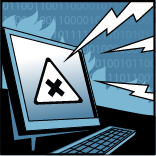According to a survey carried out jointly by B2B International and Kaspersky Lab, 13 percent of Internet users do not believe that cyber-attacks are real. They feel that the threat is exaggerated by Internet security companies. However, this complacency leaves them without any protection against a risk that threatens their data and virtual lives every day.
According to statistics, even people who accept that cyber threats are real are not always convinced they need protection against these threats. Specifically, only 22 percent of respondents believe they can be targeted by cybercriminals. However, in reality any person’s device could be of interest to attackers. Even if the owner does not store valuable data on the device and does not carry out financial transactions online, cybercriminals can make use of any computer, smartphone or tablet – perhaps by turning it into a bot that sends spam, carries out DDoS attacks, or sends phishing links via instant messaging and email.
Featured Download: Social media access at work. Do your employees know the rules?
Almost a third (32 percent) of users are not worried that their online accounts could be compromised or are even oblivious to this risk. Crucially, this applies not only to personal pages on social networking sites but also to personal online banking accounts, which could hand over a user’s personal finances to a cybercriminal. However, many people feel that financial losses resulting from cyber-attacks are extremely unlikely – 42 percent of respondents are unaware of, or are not worried about, the possibility of such losses. One thing they do not realise is that such losses may not be due to direct theft of money from their bank accounts. Malware infection can also lead to unforeseen expenses, including costs associated with the services of an IT specialist, reinstalling software, or temporary unavailability of a device. Overall, 21 percent of respondents who have had malware on their devices have incurred losses as a result of the incident.
According to the survey results, 20 percent of respondents are unaware that using public Wi-Fi networks carries the risk that any data sent over such networks can be intercepted by cybercriminals. A slightly higher proportion of users, 27 percent, are aware of this threat but do not believe they need to worry about it. At the same time, of the 55 percent of the respondents who use public networks, 12 percent enter their credentials on websites and six per cent make online payments while connected to a public network.
“People who believe that they are safe because cybercriminals will just leave them alone and won’t be interested simply don’t understand the nature of online threats. Hackers don’t usually focus on specific targets; they try to scoop up as many victims as possible. This is why it is very risky to use the Internet without a security solution,” says Elena Kharchenko, Head of Consumer Product Management, Kaspersky Lab.
Kaspersky Internet Security — Multi-Device is a solution that protects against the latest Internet threats without distracting the user or slowing down the device. It can protect devices running Microsoft Windows, Apple OS X or Google Android. It blocks malware, detects phishing and dangerous websites, warns the user of risks associated with using untrusted Wi-Fi connections, and offers secure web surfing for Apple iOS and Microsoft Windows Phone users.
About Kaspersky Lab
 Kaspersky Lab is the world’s largest privately held vendor of endpoint protection solutions. The company is ranked among the world’s top four vendors of security solutions for endpoint users*. Throughout its more than 17-year history Kaspersky Lab has remained an innovator in IT security and provides effective digital security solutions for large enterprises, SMBs and consumers. Kaspersky Lab, with its holding company registered in the United Kingdom, currently operates in almost 200 countries and territories across the globe, providing protection for over 300 million users worldwide. Learn more at www.kaspersky.com.
Kaspersky Lab is the world’s largest privately held vendor of endpoint protection solutions. The company is ranked among the world’s top four vendors of security solutions for endpoint users*. Throughout its more than 17-year history Kaspersky Lab has remained an innovator in IT security and provides effective digital security solutions for large enterprises, SMBs and consumers. Kaspersky Lab, with its holding company registered in the United Kingdom, currently operates in almost 200 countries and territories across the globe, providing protection for over 300 million users worldwide. Learn more at www.kaspersky.com.
The opinions expressed in this post belongs to the individual contributors and do not necessarily reflect the views of Information Security Buzz.



